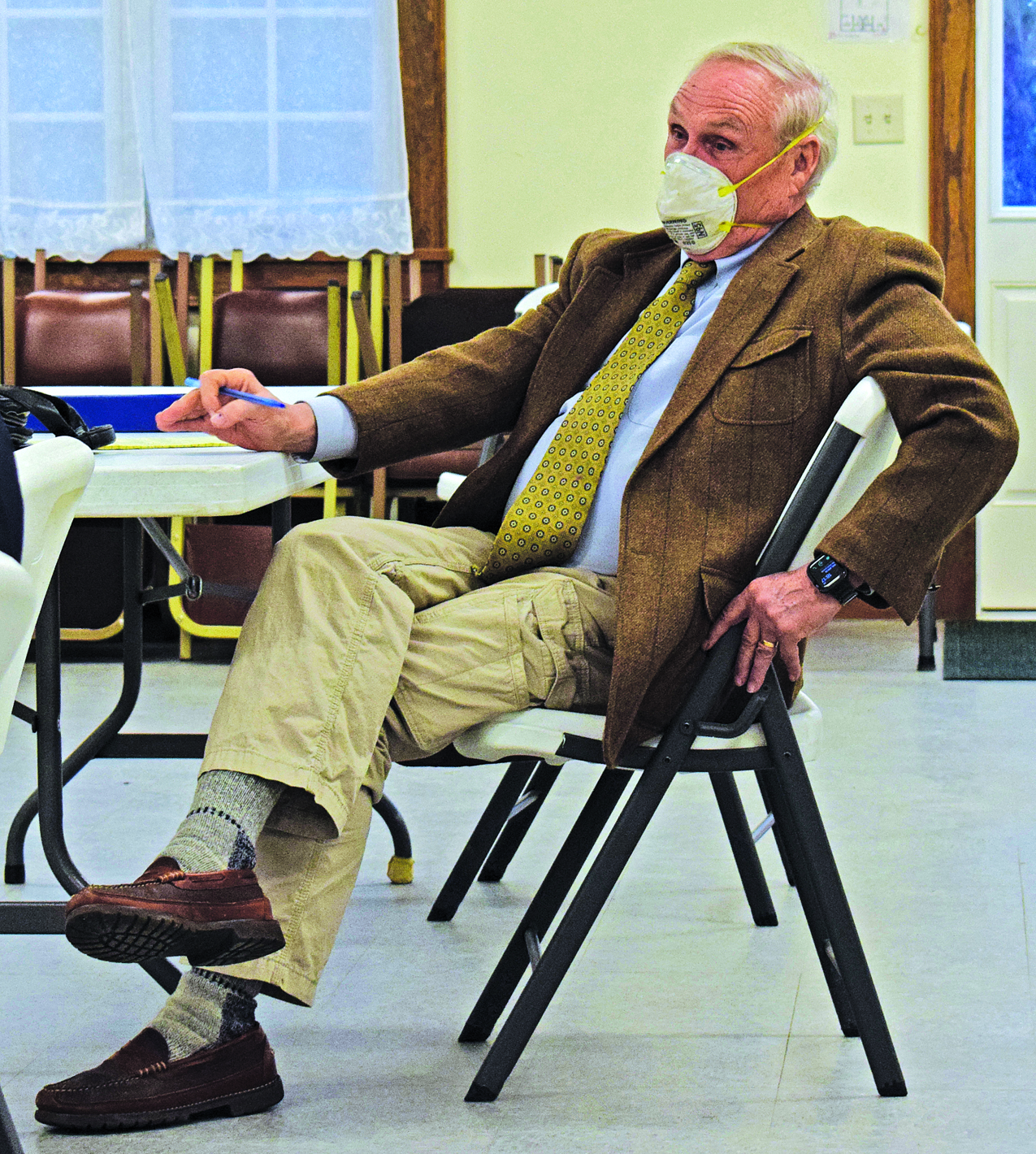
Attorney Edward Dardis addresses the Dresden Board of Appeals during a 2021 meeting. Dardis’ license to practice law was temporarily suspended by the Maine Supreme Court on Jan. 31. (LCN file photo)
Concluding that his “misconduct serves as an imminent threat to clients, the public, and to the administration of justice,” the Maine Supreme Judicial Court suspended Damariscotta-based attorney Edward G. Dardis from practicing law in the state, according to court documents.
The temporary suspension, issued by the court on Jan. 31, requires Dardis to cease any and all operations of his law practice. Dardis, a Newcastle resident, has been employed by the Damariscotta firm Howard & Bowie since 1979.
Dardis could not be reached for comment despite numerous attempts to contact him at phone numbers listed for his residence and office as well as his cellphone. The board of overseers declined to comment, citing the pending matter.
The court acted in response to a petition filed by the Maine Board of Overseers of the Bar on Jan. 25, seeking immediate interim suspension of Dardis’ law license.
In a separate ruling, the court appointed a receiver, Damariscotta attorney David Levesque, to “wind down” Dardis’ practice. Levesque said his court orders specifically concerns Dardis and confirmed Dardis was the only active attorney working in the Howard & Bowie office.
Over a 19-month period, a nonlawyer assistant working for Dardis issued checks from Dardis’ Interest on Lawyers’ Trust Account, in violation of Maine Rules of Professional Conduct, according to the petition filed by the board of overseers. The board uses the rules of conduct to regulate the professional conduct of lawyers in the state.
Interest on Lawyer Trust Accounts were created by the Maine Supreme Judicial Court to increase access to justice for individuals and families living in poverty, according to mebaroverseers.org. Operated by the Maine Justice Foundation, lawyers not exempt from participation must deposit all funds held in a trust with an eligible financial institution. The program receives funds from banking partners who contribute up to 2% interest on the trust accounts.
Starting on Feb. 2, 2021, and lasting through Sept. 15, 2022, the amount of inappropriately written checks added up to a total of $33,534.93, according to court documents.
“Memos on several checks written to C.G. (nonlawyer assistant) indicate they were for vacation pay, despite Dardis having a specific payroll account …” according to court documents.
Other checks written to the nonlawyer assistant had “unusual notations” such as “Juneteenth week,” according to court documents.
During the board’s investigation Dardis admitted to being “unaware that C.G. had written a check on his IOLTA account for personal use and refused to provide the board with records of his IOLTA account when requested,” according to the board’s petition.
“Dardis’ response to the discovery that C.G. issued and signed a check from his IOLTA account was to disregard his nonlawyer assistant’s actions and to ignore bar counsel’s lawful request for information,” the board’s petition for immediate interim suspension states.
The bar’s petition states Dardis supplied his nonlawyer assistant’s email address as the primary email address for the firm, noting he “very occasionally” uses his own address. Dardis told investigators his assistant generally handles all calls coming into the firm and on at least one occasion responded to a request for information bar counsel had sent to Dardis.
The board launched an investigation after receiving information that suggested Dardis’ nonlawyer assistant had issued a check on June 6, 2022, from his trust account, court documents show. Court records do not indicate when the investigation started or how the board received the information regarding the check.
In an answer to the petition for a court-appointed receiver filed Monday, Feb. 13, Dardis said he had “no involvement whatsoever in setting up, managing, or operating the IOLTA trust account,” and that a bookkeeper/accountant hired by Howard & Bowie in 2018 changed the entire accounting system and “apparently did not set up the IOLTA trust fund properly, if at all.”
“There are no missing client funds or property in this case,” Dardis said in the court documents. “There is no fraud, or defalcation in the matter.”
He said the bar’s petition for an ex parte subpoena was denied by the court “explicitly because there were no such facts presented or claimed.”
In his filing, Dardis said he does not object to the “winding up” of his practice because he recently experienced a “major medical crisis and life-altering surgery,” leaving him unable to continue the practice of law.
As a result of the suspension, Dardis is required to “immediately surrender possession and control of all physical and digital client files, the keys to his law offices, and all computer and mobile devices/equipment utilized by his staff” to the court-appointed receiver.
Dardis was also ordered to “relinquish any position as a designated fiduciary and take steps to receive and discharge from courts or entities that have recorded such fiduciary services” according to court records.
Orders from the court prohibit Dardis and his agents from seeking payment from clients or others owing payment to his firm.
Following Dardis’ suspension, Levesque was appointed receiver of Dardis’ legal practice by the Maine Supreme Court.
As receiver Levesque is responsible for inventorying open and closed client files and providing the files to the respective clients. Levesque is also required to notify all courts that he is serving as Dardis’ receiver until the Supreme Judicial Court orders otherwise.
Levesque is responsible for accessing Dardis’ operating accounts and interest on lawyer trust accounts to “prudently and appropriately mange/wind down the practice,” according to court documents.
“Any client can reach out to me and we will schedule a time to go by the office and retrieve their files,” Levesque said.
Clients of Dardis should call Levesque at 563-7416 or 442-7782 with any questions.






